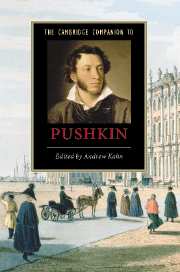Book contents
- Frontmatter
- Introduction
- Part I Texts and Contexts
- 1 Pushkin’s life
- 2 Pushkin’s lyric identities
- 3 Evgenii Onegin
- 4 Pushkin’s drama
- 5 Pushkin’s long poems and the epic impulse
- 6 Prose fiction
- 7 Pushkin and politics
- 8 Pushkin and history
- 9 Pushkin and the art of the letter
- 10 Pushkin and literary criticism
- Part II The Pushkinian tradition
- Appendix on verse-forms
- Guide to further reading
- Index
4 - Pushkin’s drama
from Part I - Texts and Contexts
Published online by Cambridge University Press: 28 March 2007
- Frontmatter
- Introduction
- Part I Texts and Contexts
- 1 Pushkin’s life
- 2 Pushkin’s lyric identities
- 3 Evgenii Onegin
- 4 Pushkin’s drama
- 5 Pushkin’s long poems and the epic impulse
- 6 Prose fiction
- 7 Pushkin and politics
- 8 Pushkin and history
- 9 Pushkin and the art of the letter
- 10 Pushkin and literary criticism
- Part II The Pushkinian tradition
- Appendix on verse-forms
- Guide to further reading
- Index
Summary
In the realm of theatre, Pushkin was a provocateur. Passionate about spectacle, he criticised most Russian performance practice of his time - neoclassical tragedy, melodrama, vaudeville, sentimentalist and patriotic-historical drama - for its pompous diction and predictable plotting. Only verse comedy and religious drama were exempt. He had strong opinions on theatre reform and hoped to enter Russia into pan-European debates over the proper purposes of drama. As a playwright, however, Pushkin encountered constant obstacles. He abandoned all his teenage efforts at verse comedy; attempts to publish his play on Grishka Otrepiev and Tsar Boris were frustrated for years. Plans and dramatic fragments (about twenty-five) far outnumber the completed works.
The masterpieces that did emerge, Boris Godunov (1825-30) and the four Little Tragedies (1830), have thrilled and mystified readers. But their stageability remains in dispute. Did Pushkin write 'closet drama'? In the plays themselves, events often occur with lightning speed, in improbable locales. Even with Shakespearean precedent, the on-stage battle scenes in Boris (where regiments gallop off and horses die on stage) are difficult to envisage; the penultimate scene of Rusalka takes place on the bottom of a river. Pushkin’s words can be as difficult to realise as his spaces - especially the stage directions.
- Type
- Chapter
- Information
- The Cambridge Companion to Pushkin , pp. 57 - 74Publisher: Cambridge University PressPrint publication year: 2006

